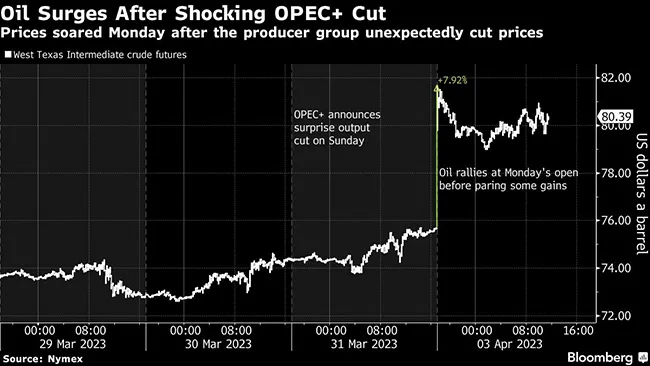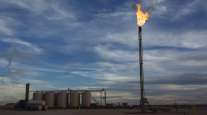Bloomberg News
Oil Surges After OPEC+’s Shocking Production Cut

[Stay on top of transportation news: Get TTNews in your inbox.]
Oil rallied the most in more than a year after OPEC+ unexpectedly announced output cuts that threaten to tighten the market and deliver a fresh inflationary jolt to the world economy.
The Organization of Petroleum Exporting Countries and allies, including Russia, pledged to make cuts exceeding 1 million barrels a day starting next month and lasting through the end of the year. The reduction surprised markets, which had expected the cartel to hold output steady. Adding to the shock, the decision came outside of the group’s scheduled timetable for reviewing the market’s demand and member’s supplies.
“OPEC+ shows commitment to protecting against the downside,” said Nadia Martin Wiggen, a partner at Pareto Securities. “The duration of the cut is the most surprising and bullish part.”
The decision quickly rippled across global oil markets. Goldman Sachs Group Inc. lifted price forecasts for this year and 2024, key timespreads surged higher amid expectations of tighter supply and a usually quiet Asian trading session saw hundreds of thousands of contracts change hands. U.S. gasoline futures also surged, underscoring inflationary risks.
April 3 Prices
- WTI for May delivery rose $4.63 to $80.30 a barrel at 11:59 a.m. ET.
- Futures rallied by as much as 8% earlier, the biggest intraday increase since March 2022.
- Brent for June settlement gained $4.80 to $84.69 a barrel.
Before the surprise intervention, crude had capped a 5.7% quarterly drop amid banking-sector turmoil and recession risks. Still, many market watchers had said they expected a rebound in the second half, underpinned by rising demand in China.
The White House said the OPEC+ decision was ill-advised, while adding the U.S would work with producers and consumers to contain gasoline prices. Last year, President Joe Biden ordered an unprecedented release from the nation’s strategic crude reserves after Russia’s invasion of Ukraine.

Costlier crude threatens to add to inflation, complicating central banks’ efforts to tame persistent price pressures. The U.S. Federal Reserve raised interest rates again last month, and officials are next scheduled to meet in May to set monetary policy.
Want more news? Listen to today's daily briefing below or go here for more info:




